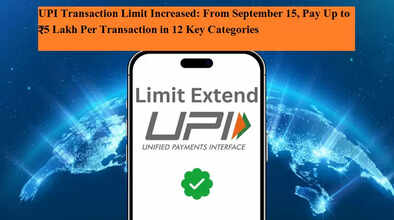UPI Transaction Limit Increased: From September 15, Pay Up to ₹5 Lakh Per Transaction in 12 Key Categories

UPI Limit Extension by NPCI (10 September 2025): The National Payments Corporation of India (NPCI) has announced a major update for users of the Unified Payments Interface (UPI). Starting 15 September 2025, the transaction limit will be increased across several categories to make high-value payments smoother and more convenient.
While the person-to-person (P2P) transaction limit remains unchanged at ₹1 lakh per day, the ceiling for categories such as insurance, capital markets, credit card bill payments, travel, and government transactions has been significantly raised. This move is expected to benefit millions of users who rely on UPI for secure and instant payments.
Key Highlights of the New UPI Rules
-
Effective Date: 15 September 2025
-
Maximum Limit per Transaction (select categories): ₹5 lakh
-
Daily Transaction Limit for 12 categories: Up to ₹10 lakh
-
P2P Transfers: No change — still capped at ₹1 lakh per day
Tax and Government Payments Get a Boost
One of the most impactful changes is in tax-related payments. From now on, taxpayers can make transactions of up to ₹5 lakh per payment via UPI. Similarly, payments made on the Government e-Marketplace (GeM), as well as for travel and merchant-related business transactions, will now have a higher limit of ₹5 lakh per transaction.
Insurance, Stock Market, and Credit Cards Up to ₹10 Lakh
As per the update shared on BHIM UPI’s official social media handle, high-value payments such as insurance premiums, stock market investments, and credit card bill settlements will now enjoy a daily transaction limit of ₹10 lakh. This ensures users can carry out large financial commitments seamlessly without depending on other modes of payment.
Importantly, the credit card bill payment cap has been raised to ₹6 lakh per day, a change that will particularly benefit customers with premium cards or higher spends.
Updated UPI Transaction Categories and Limits
| Category | Per Transaction Limit (₹) | 24-Hour Total Limit (₹) |
|---|---|---|
| Capital Market | 5 lakh | 10 lakh |
| Insurance | 5 lakh | 10 lakh |
| Government e-Marketplace (EMD) | 5 lakh | 10 lakh |
| Travel | 5 lakh | 10 lakh |
| Credit Card Payments | 5 lakh | 6 lakh |
| Collections | 5 lakh | 10 lakh |
| Jewellery | 2 lakh | 6 lakh |
| Business/Merchant Transactions | 5 lakh | — |
| FX Retail BBPS | 5 lakh | 5 lakh |
| Digital Account Opening | 5 lakh | 5 lakh |
| Digital Account Initial Funding | 2 lakh | 2 lakh |
Why NPCI Increased the Limit
The move comes at a time when UPI has become India’s most popular digital payment system. With rising adoption in sectors such as insurance, investments, and government services, the need for higher transaction limits was widely felt.
-
Ease for taxpayers: Large tax payments can now be made through UPI instead of relying on NEFT/RTGS.
-
Boost to financial markets: Investors can directly route higher sums into capital markets without splitting transactions.
-
Convenience for consumers: Paying hefty insurance premiums or clearing high-value credit card dues becomes smoother.
Effective from 15th September, now make high-value payments seamlessly with UPI! NPCI has increased the transaction limit to ₹10 lakh within 24 hours for categories like insurance premiums & capital markets, making big payments easier and faster than ever.#NewUPILimits pic.twitter.com/SEmjro8Rop
— BHIM (@NPCI_BHIM) September 8, 2025
What Stays the Same
For person-to-person (P2P) transfers, there is no change. Users can still send up to ₹1 lakh per day between individuals. NPCI has clarified that these updates apply only to specific categories of payments and not to regular peer-to-peer transactions.
About UPI
The Unified Payments Interface (UPI), developed by NPCI under the guidance of the Reserve Bank of India (RBI), allows instant money transfers between bank accounts. Built on the IMPS (Immediate Payment Service) system, UPI has revolutionized digital payments in India with its speed, reliability, and ease of use.
Final Takeaway
From 15 September 2025, UPI users will be able to transact up to ₹5 lakh per payment across 12 categories and enjoy daily limits of up to ₹10 lakh in sectors like insurance and capital markets. This update not only strengthens UPI’s role in everyday transactions but also expands its utility for large financial commitments.
For millions of Indians, this step is set to make UPI even more indispensable in the coming years.

